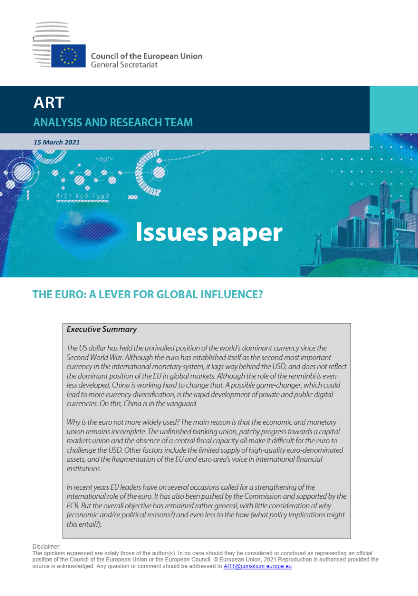
Resumen:El dólar estadounidense ha ocupado la posición sin rival de moneda dominante en el mundo desde la Segunda Guerra Mundial. Aunque el euro se ha consolidado como la segunda moneda más importante del sistema monetario internacional, va muy por detrás del dólar y no refleja la posición dominante de la UE en los mercados mundiales. Aunque el papel del renminbi está aún menos desarrollado, China se esfuerza por cambiar esta situación. Un posible cambio de juego, que podría conducir a una mayor diversificación de las divisas, es el rápido desarrollo de las monedas digitales privadas y públicas. En esto, China está a la vanguardia. ¿Por qué no se utiliza más el euro? La razón principal es que la unión económica y monetaria sigue incompleta. La inacabada unión bancaria, los irregulares avances hacia una unión de los mercados de capitales y la ausencia de una capacidad fiscal central dificultan que el euro desafíe al dólar. Otros factores son la limitada oferta de activos de alta calidad denominados en euros y la fragmentación de la voz de la UE y la zona del euro en las instituciones financieras internacionales. En los últimos años, los dirigentes de la UE han pedido en varias ocasiones que se refuerce el papel internacional del euro. También lo ha impulsado la Comisión y lo ha apoyado el BCE. Pero el objetivo global ha seguido siendo bastante general, con poca consideración al por qué (¿razones económicas y/o políticas?) y menos aún al cómo (¿qué implicaciones políticas podría conllevar?).
Summary:The US dollar has held the unrivalled position of the world's dominant currency since the Second World War. Although the euro has established itself as the second most important currency in the international monetary system, it lags way behind the USD, and does not reflect the dominant position of the EU in global markets. Although the role of the renminbi is even less developed, China is working hard to change that. A possible game-changer, which could lead to more currency diversification, is the rapid development of private and public digital currencies. On this, China is in the vanguard. Why is the euro not more widely used? The main reason is that the economic and monetary union remains incomplete. The unfinished banking union, patchy progress towards a capital markets union and the absence of a central fiscal capacity all make it difficult for the euro to challenge the USD. Other factors include the limited supply of high-quality euro-denominated assets, and the fragmentation of the EU and euro area's voice in international financial institutions. In recent years EU leaders have on several occasions called for a strengthening of the international role of the euro. It has also been pushed by the Commission and supported by the ECB. But the overall objective has remained rather general, with little consideration of why (economic and/or political reasons?) and even less to the how (what policy implications might this entail?)
Fecha publicación: 2023
Autor: Secretaría General del Consejo
ISBN / ISSN: 978-92-824-9495-0
Link: https://n9.cl/arac9
Palabras clave: economía internacional , euro , geopolítica , mercado de capitales , mercado internacional , relaciones monetarias , sistema monetario internacional , Unión Económica y Monetaria
Keywords: euro , geopolitics , geopolitical , capital markets , international economy , international monetary relations , international monetary system , economic and monetary union , international monetary relations , international capital markets
